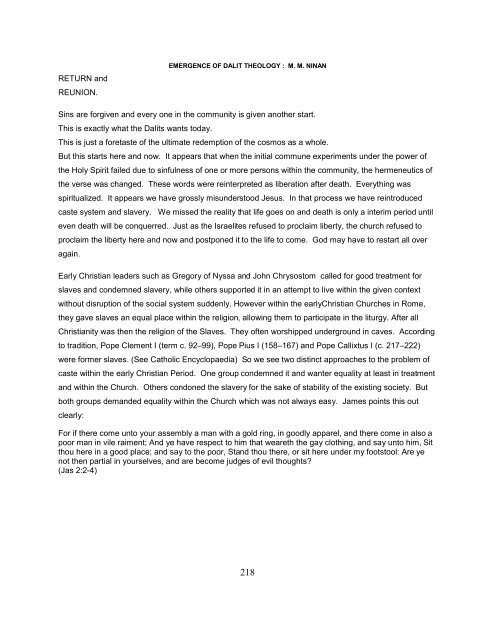Dalit Theology2
You also want an ePaper? Increase the reach of your titles
YUMPU automatically turns print PDFs into web optimized ePapers that Google loves.
RETURN and<br />
REUNION.<br />
EMERGENCE OF DALIT THEOLOGY : M. M. NINAN<br />
Sins are forgiven and every one in the community is given another start.<br />
This is exactly what the <strong>Dalit</strong>s wants today.<br />
This is just a foretaste of the ultimate redemption of the cosmos as a whole.<br />
But this starts here and now. It appears that when the initial commune experiments under the power of<br />
the Holy Spirit failed due to sinfulness of one or more persons within the community, the hermeneutics of<br />
the verse was changed. These words were reinterpreted as liberation after death. Everything was<br />
spiritualized. It appears we have grossly misunderstood Jesus. In that process we have reintroduced<br />
caste system and slavery. We missed the reality that life goes on and death is only a interim period until<br />
even death will be conquerred. Just as the Israelites refused to proclaim liberty, the church refused to<br />
proclaim the liberty here and now and postponed it to the life to come. God may have to restart all over<br />
again.<br />
Early Christian leaders such as Gregory of Nyssa and John Chrysostom called for good treatment for<br />
slaves and condemned slavery, while others supported it in an attempt to live within the given context<br />
without disruption of the social system suddenly. However within the earlyChristian Churches in Rome,<br />
they gave slaves an equal place within the religion, allowing them to participate in the liturgy. After all<br />
Christianity was then the religion of the Slaves. They often worshipped underground in caves. According<br />
to tradition, Pope Clement I (term c. 92–99), Pope Pius I (158–167) and Pope Callixtus I (c. 217–222)<br />
were former slaves. (See Catholic Encyclopaedia) So we see two distinct approaches to the problem of<br />
caste within the early Christian Period. One group condemned it and wanter equality at least in treatment<br />
and within the Church. Others condoned the slavery for the sake of stability of the existing society. But<br />
both groups demanded equality within the Church which was not always easy. James points this out<br />
clearly:<br />
For if there come unto your assembly a man with a gold ring, in goodly apparel, and there come in also a<br />
poor man in vile raiment; And ye have respect to him that weareth the gay clothing, and say unto him, Sit<br />
thou here in a good place; and say to the poor, Stand thou there, or sit here under my footstool: Are ye<br />
not then partial in yourselves, and are become judges of evil thoughts?<br />
(Jas 2:2-4)<br />
218


















